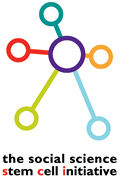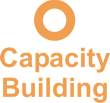BULLETIN FIVE - WINTER 2009
![]()
Since the last quarterly SCI e-bulletin there have been two important events which SCI members have played a key role in developing. They both relate to that contemporary buzz-word of all emergent technologies, especially those in health, ‘translational’ science.
Scale-Up of stem cell research
The first was a highly successful, invitation only, meeting which brought together 25 experts from the bioscience, social science, regulation, and corporate communities to discuss the technical, organisational and market-related problems of translating discovery-led stem cell science into commercial products. Unlike many other meetings on this issue which tend to focus on a range of issues with little real depth, this meeting focused exclusively on the questions posed by automation.
The last few years has seen an increased interest in process automation technologies in the field of stem cell research and commercialisation. One proposition is that automation of manual processes will increase standardisation, reduce uncertainty by reducing variability and ultimately reduce cost. The introduction of standard automated systems would not only stabilise practices across laboratories but also by extension stabilise cell lines. Furthermore, the gradual calibration of cell culture systems could serve to further the understanding of ES cells and other types of cell.
Others argue that the push towards automation of cell culture, while welcome in the long-term is premature and raise the question of what sort of underlying knowledge base is required to successfully standardise something. Other types of automated technologies such as imaging systems and screening systems are broadly welcomed as a valuable addition to the field. Moreover, there is concern that process automation may have a deleterious effect on the functional properties of cells, so affecting their quality and so utility.
The central concerns of the field as a whole relate to securing repeatable cultures and scalable cost effective GMP automation; when and how it may be achieved and what hurdles might be anticipated on the way. Underlying this is the complex interrelationship between our understanding of the cells, the requirements for their use, the measurement methods we use to characterise cells, and the automated process technologies capacity to work with these in the presence of biological variation.
A full report of the meeting is available here - pdf. Some of the core messages are:
- There is a need for the optimisation of discovery science before moving towards automation
- It is important to distinguish between variability as a biological process and as a problem related to the automation process
- While autologous cells need fewer passages to generate clinically useful products if we want to scale up (eg bone marrow stem cell culture) there is a need to optimise platforms across both embryonic and somatic cells
- A key issue is to ensure that the regulatory guidelines in regard to reproducibility are made clear so firms can feel secure in their techniques for scale-up
- There is a need to define what the production criteria are likely to be before the move towards securing clinical grade lines
This last point raises questions about the MRC’s recent funding for clinical grade lines – is this too soon to be useful?
The workshop concluded that there is a need a non-commercial intermediary agency to provide this service which is located in the public-sector but works in liaison with industry. This might be the UKSCB which already has strong links to both discovery science labs, regulators (MHRA especially) and SMEs. This might best be delivered through a consortium involving the UK Research Councils, industry (such as through the BioIndustry Association) and the DH.
The meeting was co-organised by the ESRC SCI and the EPSRC remedie project.
Public Scale-up: translating public opinion into R&D
The second, very different, event was the Launch of the BBSRC/MRC joint report on a variety of stakeholder attitudes towards stem cell research : the Stem Cell Dialogue. The full report is available here - html and a copy of the presentation given by Dr Darren Bhattachary, Director BMRB is available here - pdf
Andrew Webster, SCI Director, not only served as a member of a steering group that oversaw the developing report and its series of Workshops, but was also invited to speak at the Launch event in London, attended by Lord Drayson, Minister for Science and innovation. Webster made a number of comments about the study, summarised here:
First, it is clear that people’s position on the value and place of stem cell research reflects quite different concerns about the source of cell, which is not surprising given that this shows how people give different moral weight to different tissue sources, something the SCI has already reported on in the UK and globally through Brian Salter’s research.
Secondly, the report nicely reflects the ambivalences among respondents: for example while embryonic stem cells are seen as the most ethically difficult area thee is still a strong belief that if they are to be used to understand diseases and provide a basis for clinical treatment they should be used. Some results just published from the SCI network by Sarah Parry and her colleagues show how the public are more accommodating of experimental clinical research than they are of upstream scientific research.
Finally, the report provided a very fair and balanced assessment of the main issues and it was especially pleasing to see the recommendation that the focus of this sort of ‘dialogical’ exercise should switch from large scale structured exerciuses and events to more everyday understanding of the practice in labs, regulatory agencies and the clinic. Webster sess this as an important turn from ‘the public understanding of science’ to a multiple public’s ‘understanding of science as practice’ – the need in other words to devote as much attention among all parties towards understanding the complexities and uncertainties of ‘translational science’.
![]()
Andrew Webster, SCI Co-ordinator, secured a highly competitive International Visiting Fellowship funded by the University of Sydney which supported a two month visit to the university between July and August 2008. The Fellowship provided an opportunity to examine the translation of stem cell science and more generally regenerative medicine to both clinical and corporate contexts, working in particular with Professor Waldby who is an international expert in the social and cultural aspects of the global tissue economy.
In addition to this work he gave five papers, including a podcast Public Lecture (see http://www.usyd.edu.au/news/84.html?newsstoryid=2471) within the Department (and wider School and University) relating to:
- understanding the novelty of new technologies and how they are to be evaluated in terms of their social and cultural contexts of use
- UK work on stem cells science and results from the Stem Cell Initiative
- Working across the bioscience/social science interface, especially within a policy context: how does social science influence the health and medical research agenda?
Andrew also took the opportunity to meet with members of the Australian policy community based in Sydney to discuss the current situation with respect to both somatic and embryonic stem cells, and the distinctive positions taken by the Federal and State-based authorities.
Research Communication Activities
- Andrew was invited to be a member of the Scientific Steering Committee for the UKNSCN meeting due to take place in Oxford, April 09.
- A media consultant has been recruited to write a series of specialist articles for the Initiative. Sophie Goodchild is an independent journalist who has written articles for the Guardian, The Scotsman, Evening Standard, The Daily Mail and The Independent where she was chief reporter for the last two of nine years.
- Stefan Timmermans is coming over to the UK to take part in a visiting fellowship. To be hosted by Clare Williams and Stephen Wainwright.
- Genomics Forum Event. Organised by Christine Knight. It will be a workshop event for the ESRC Festival of Social Science in March, to examine the policymaking process leading to the passage of the Human Fertilisation and Embryology Bill. The aim will be to promote reflection and discussion on the process by which a decision was ultimately made, as a case study of national decision making about a controversial area of science.
![]()
The SCI in collaboration with the ESRC Realities Research centre in Manchester, organised a workshop that explored transdisciplinary research – within the social sciences and between then and the biosciences.
A full report will be appearing shortly, but the main conclusions of the day are as follows:
In transdisciplinary research while partners may be able to come together in sharing a ‘boundary object’ there are likely to be multiple answers and relevancies across the contributing disciplines;
The relevance and purposes of transdisciplinary research can change over the life-time of a project, reflecting changing forms of engagement and outcome, some intended some not;
When transdisciplinary dialogue takes place this reveals the research object to be more complex than expected and shows how the analysis that emerges can reveal some and hide other dimensions;
The site where we engage in transdisciplinary dissemination can vary hugely, from jointly-authored papers, to policy documents, to reflective commentaries on the experience. These offer different formats and so more, or less, opportunity to reflect on the strengths and limitations of transdisciplinarity.
The importance of the meeting relates to the fact that most of the UK research Councils are pushing the transdisciplinary agenda very firmly. The full report of the workshop, which will be prepared soon, will be sent to the ESRC for its consideration.
![]()
Prof Clare Williams and Prof Brian Salter, base at CBAS, King's College London have just appointed a new PhD student Mansooreh Saniei. Mansooreh's research is on Ethics, policy and regulation of human embryonic stem cell research in Iran.
Further information about Mansooreh's PhD can be found here - html
Clare will also shortly be advertising PhD studenships for CBAS' new Wellcome Trust award Ethics of Translational Research: from ‘unnatural entities’ to experimental treatments. LABTEC - London & Brighton Translational Ethics Centre.
Further details about LABTEC are currently here - html and will move to a dedicated site in Spring 2009





